Filter by

The Greenhouse Gas Balance of Italy
The book addresses in a comprehensive way the full greenhouse gases budget of the Italian landscape, focusing on land use and terrestrial ecosystems. In recent years there has been a growing interest in the role of terrestrial ecosystems with regard to the carbon cycle and only recently a regional approach has been considered for its specificity in terms of new methodologies for observations an…
- Edition
- 1
- ISBN/ISSN
- 978-3-642-32424-6
- Collation
- VIII, 211, 27 b/w illustrations, 30 illustrations in colour
- Series Title
- Environmental Science and Engineering
- Call Number
- -

The Great Council of Malines in the 18th century
This work studies the Great Council of Malines as an institution. It analyzes the Council’s internal organization and staff policy, its position within the broader society of the Austrian Netherlands, the volume and nature of litigation at the Council and its final years and ultimate demise in the late 18th and early 19th century. By means of this institutional study, this volume provides ins…
- Edition
- 1
- ISBN/ISSN
- 978-3-319-09638-4
- Collation
- XVII, 348, 18 illustrations in colour
- Series Title
- Studies in the History of Law and Justice
- Call Number
- -
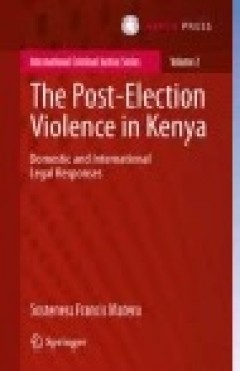
The Post-Election Violence in Kenya
In the spirit of this road map, the author analyzes the post-election violence in Kenya from a legal point of view. He extensively examines legal options for domestic criminal accountability and discusses both retributive (prosecutions) and restorative justice (mainly truth commission) mechanisms, being the main legal responses to the gross violations of human rights. Furthermore, he thoroughly…
- Edition
- -
- ISBN/ISSN
- 978-94-6265-041-1
- Collation
- XVIII, 275
- Series Title
- International Criminal Justice Series
- Call Number
- -

Consumer Protection Law : A Guide for Navigating Safely in the Modern World
Overview: Consumer Protection Law: A Guide For Navigating Safely in the Modern World is an introduction to the issues consumers face every day and the protections put in place to reduce consumer harm. This text and the course it is designed to accompany is unique in undergraduate education. Most consumer protection law courses take place in either a law school setting or in only a handful of un…
- Edition
- -
- ISBN/ISSN
- -
- Collation
- -
- Series Title
- -
- Call Number
- 340 SMI c
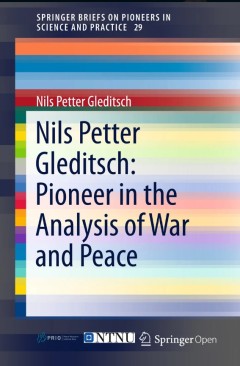
Nils Petter Gleditsch: Pioneer in the Analysis of War and Peace
This book presents Nils Petter Gleditsch, a staff member of the Peace Research Institute of Oslo (PRIO) since 1964, a former editor of the Journal for Peace Research (1983-2010), a former president of the International Studies Association (2008-2009) and the recipient of several academic awards as a pioneer in the scientific analysis of war and peace. This unique anthology covers major themes i…
- Edition
- 1
- ISBN/ISSN
- 978-3-319-03819-3
- Collation
- XXI, 171
- Series Title
- SpringerBriefs on Pioneers in Science and Practice
- Call Number
- -
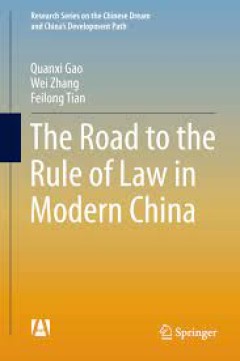
The Road to the Rule of Law in Modern China
This book is a grand review of the centurial development of rule of law in China. It covers the most important issues in this area and presents “political constitution,” a new interpretative framework that allows the Chinese experience of rule of law to be more fully and correctly expressed. It is especially useful to scholars involved in the study of modern China. The main chapters of this…
- Edition
- -
- ISBN/ISSN
- 978-3-662-45637-8
- Collation
- -
- Series Title
- -
- Call Number
- -
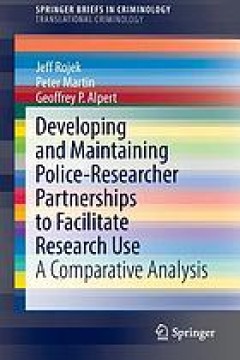
Developing and maintaining police-researcher partnerships to facilitate resea…
This Brief discusses methods to develop and maintain police / researcher partnerships. First, the authors provide information that will be useful to police managers and researchers who are interested in creating and maintaining partnerships to conduct research, work together to improve policing and help others understand the linkages between the two groups. Then, more specifically, they describ…
- Edition
- -
- ISBN/ISSN
- 9781493920556
- Collation
- xii, 84 pages ; 23 cm.
- Series Title
- -
- Call Number
- 363.23
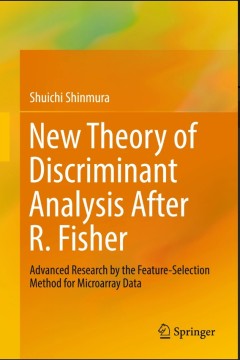
New Theory of Discriminant Analysis After R. Fisher
This is the first book to compare eight LDFs by different types of datasets, such as Fisher’s iris data, medical data with collinearities, Swiss banknote data that is a linearly separable data (LSD), student pass/fail determination using student attributes, 18 pass/fail determinations using exam scores, Japanese automobile data, and six microarray datasets (the datasets) that are LSD. We deve…
- Edition
- 1
- ISBN/ISSN
- 978-981-10-2164-0
- Collation
- XX, 208
- Series Title
- -
- Call Number
- -
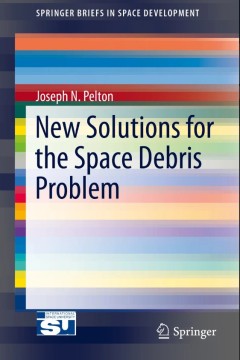
New Solutions for the Space Debris Problem
Addressing a pressing issue in space policy, Pelton explores the new forms of technology that are being developed to actively remove the defunct space objects from orbit and analyzes their implications in the existing regime of international space law and public international law. This authoritative review covers the due diligence guidelines that nations are using to minimize the generation of …
- Edition
- 1
- ISBN/ISSN
- 2191-8171
- Collation
- XI, 94
- Series Title
- SpringerBriefs in Space Development
- Call Number
- -
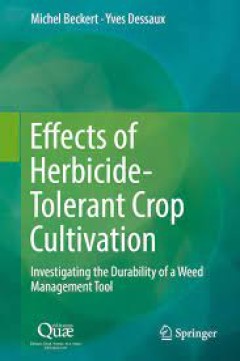
Effects of Herbicide-Tolerant Crop Cultivation Investigating the Durability …
Overall, this work identifies key points to be taken into account when drawing up guidelines that govern the use of herbicide-tolerant (HT) crops in order to preserve the effectiveness of this innovation over time. This multidisciplinary expert report, based on an international literature review, assesses the effects of the cultivation of crops possessing HT traits. HT crops may appear to be u…
- Edition
- -
- ISBN/ISSN
- 978-94-024-1007-5
- Collation
- -
- Series Title
- -
- Call Number
- -
 Computer Science, Information & General Works
Computer Science, Information & General Works  Philosophy & Psychology
Philosophy & Psychology  Religion
Religion  Social Sciences
Social Sciences  Language
Language  Pure Science
Pure Science  Applied Sciences
Applied Sciences  Art & Recreation
Art & Recreation  Literature
Literature  History & Geography
History & Geography